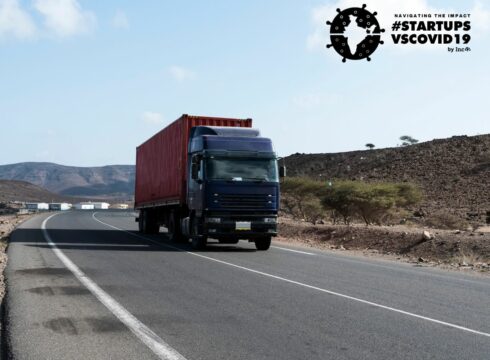SUMMARY
The countrywide lockdown severely impacted supply chain network
Logistics technology is proving helpful for sectors like ecommerce
Logistics startups believe it will take a few months to return to normal supply chain
Inc42 Daily Brief
Stay Ahead With Daily News & Analysis on India’s Tech & Startup Economy
Covid19 Tech Impact
Latest updates & innovations, in-depth resources, live webinars and guides to help businesses navigate through the impact of the COVID19 pandemic on India's economy.
After initial travel restrictions turned into countrywide lockdown, daily life has been severely impacted. People have been asked to work from home while other offline businesses have shuttered their stores, but as the country fights pandemic, one common thread here is that most citizens are facing a dearth of necessities and essentials such as grocery or medical supplies.
After the initial panic buying in the retail market, those who had opted for online orders were stuck with delays in delivery as the lockdown was imposed. Several orders were cancelled, with money stuck in wallets, and complaints rising.
From a macro perspective, the challenge was for the entire supply chain— from factories to wholesalers— to retailers— to customers. However, on a micro-level, the issue was that despite being allowed as essentials, ecommerce companies were stopped by police on the ground.
To begin with, the challenge for retailers was in maintaining stocks for the increased demand. This pressure of demand caused an effect across the chain. It was especially challenging considering the dependency on procuring goods from wholesalers. In an ideal scenario, retailers stock up for multiple weeks, but that is usually not done in India due to issues with storage. Sourcing from wholesalers was further restricted due to restrictions on intracity travel.
Finally, the delivery of goods from wholesalers or warehouses to consumers and kirana stores was also hampered due to on-ground issues. Meeting the demand surge without continuous production was a massive challenge due to lockdown rules. In short, the entire supply chain was disrupted badly.
On the initial challenges, last-mile and intercity logistics tech provider Locus cofounder and CEO Nishith Rastogi said that there is added pressure on certain companies to meet the essential goods demand of consumers in these testing times. “Order volumes have increased by 3-5x, while companies are operating at 40-60% capacity. They must redesign their logistics, and our systems must be agile to scale up and help them surpass these hurdles.”
In terms of sector-based demand, Rastogi noted that order volumes surged 3-5x for large legacy firms, while there is an increase of 60%-70% for new technology-led smaller players in the essential goods space.
“Ecommerce/fashion retail deliveries have gone down by 80-90%, and we see a steep decline in eye checkup/ blood tests. Pharmacy services are witnessing a dip and catering to 20% order volume in comparison to usual,” he added.
Ashish Jhina, cofounder and COO, Jumbotail said that there is at least 30%-40% shortage in delivery staff, which is compounding problems. Staff shortage has hit the entire value chain – from manufacturing units to warehouse workers to the delivery fleet. “Currently the safety stock held in the value chain is serving the demand. However, if manufacturing does not resume, it will start impacting product availability,” he added.
Even though the pathway has been cleared for food and grocery delivery, the lockdown has created a massive backlog of orders and shipments stuck in hubs and warehouses of many logistics operators. “Once the deliveries of non-essential goods commence this challenge will slowly ease-out,” he added.
The government has recently clarified that non-essential products can be transported too, but they won’t be allowed to be sold and hence, not much movement has been seen in the segment.
Logistics technology is proving helpful for sectors like ecommerce where technology backend helps companies in route planning and optimization, fleet and rider optimization, and also with analytics.
Startups said they are working with the government and police to ensure unhindered operations in fulfilment centres, and distribution of goods to kirana stores and grocery delivery services.
At the same time, ecommerce platforms also have to develop safeguards against hoarding, including blocking large-volume sales.
“We had to develop valuable features overnight such as downloadable voluntary identity cards for kirana store owners who are Jumbotail customers to self identify themselves to government authorities for free movement between their shops and home,” Jhina said.
As delivery operations get smoother in the second week of the lockdown, companies said that many of their partners are slowly resuming operations for essential goods. Both the number of partners and number of serviceable pin-codes for essential goods is increasing on a daily basis.
Akshay Ghulati, cofounder and CBO, Shiprocket said the issues with manforce are being overcome as on the ground authorities have more information and curfew passes are being issued.
“We are working to overcome this challenge by onboarding new partners on our platform which have their own network for intracity deliveries to ensure essential shipments are not impacted. We also expect intercity shipments for essential goods to be started soon with our existing courier partners,” he added.
However, Ghulati added that even though it expects fewer restrictions and freer movement of goods in May, it will take a few months for things to get back to normal.
“With each passing day, the regulations and support being provided are getting better. Companies are now able to manage the demand better, and the entire community, across customers and businesses, are joining forces. Companies that will use technology for logistics operations will be able to adapt better to the changing scenarios in the coming weeks,” Rastogi added.
Note: We at Inc42 take our ethics very seriously. More information about it can be found here.


